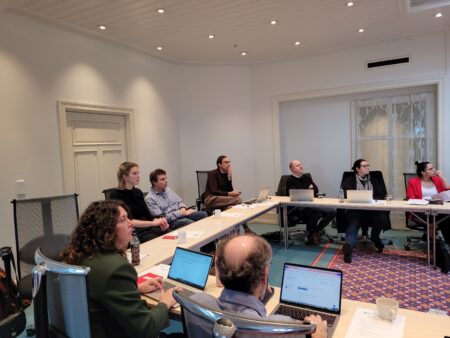
‘EBV-MS’ research funded by Horizon Europe kick-starts in Norway
16.02.2024EMSP participated in the kick-off meeting of one its newly received Horizon EU-funded projects: EBV-MS.
In a hybrid event on 22 and 23 January, the consortium partners from Europe and the USA gathered in Bergen, Norway to kick-off this project and coordinate plans together. EBV-MS, led by the University of Bergen (UiB), aims to uncover the role of Epstein-Barr virus (EBV) in Multiple Sclerosis (MS), its onset and progression, especially in the light of recent research in EBV’s role in triggering the development of MS. The research project aims to understand why only a few EBV-infected people develop MS, and define the underlying mechanism of this process. The research will also aim to investigate if targeting the EBV infection with antiviral treatments can improve the disease course or stop disease progression.
Consortium partners engaged in several key activities, as organised by UiB, to initiate this collaborative research project. Each partner introduced themselves and their organisations, fostering a sense of community and understanding among the consortium members. The meeting included a comprehensive overview of the project’s objectives, scope, and expected outcomes, ensuring all partners are aligned with the overarching goals. Discussions regarding project management, timelines, and deliverables were a paramount component to establish a cohesive work plan, with focus on the action plan of the first year. Partners also outlined their specific roles, responsibilities, and contributions to the project, fostering transparency and accountability within the consortium. Throughout the kickoff meeting, emphasis was placed on building strong communication channels and fostering collaboration to maximise the project’s potential for success within the EU Horizon framework.

EBV-MS Consortium Partners
Throughout its various work packages, research partners will address various domains in virology, immunology, genetics neurology, artificial intelligence and patient engagement to reach its objectives.
EBV-MS aims to:
- Determine if EBV is a target of treatment for people with MS in two clinical trials with antivirals as add-on treatments.
- Investigate how different variations of the virus interact with the immune system, aiming to identify which EBV variant is relevant in MS so they can be used to identify people at higher risk of developing MS or progressing MS.
- Understand what the time interval is between getting infected with EBV and the clinical onset of MS, this way researchers can identify which drugs can modify this interval or predict MS progression.
- Use machine learning to develop prevention treatment strategies to predict and detect individuals at high risk of developing MS and progression to people already diagnosed with MS
In specific, EMSP will be involved as part of the clinical trials to engage people with MS through its MS Community Advisory Board, aiming to inform the clinical trial based on consultations with expert patients. EMSP will also be closely involved in the engagement coordination team to keep people with MS informed, consulted, involved and engaged. EMSP will be proactive in all the communication, dissemination and exploitation efforts of EBV-MS targeting people with MS, MS patient organisations and advocacy groups. Based on the findings of this project, EMSP will develop a policy brief with recommendations as well as a social campaign to influence decision-makers regarding access to treatment, raising awareness about the findings and their potential and impact.
Read more about the project in the press release here: https://www.eurekalert.org/news-releases/1001932 and stay tuned for the project’s upcoming website in May, 2024.

“This project has received funding from the European Union’s Horizon Europe Research and Innovation Actions under grant no.101136991 (EBV-MS). Views and opinions expressed are however those of the author(s) only and do not necessarily reflect those of the European Union nor the granting authority. Neither the European Union nor the granting authority can be held responsible for them.”
 Your Account
Your Account

